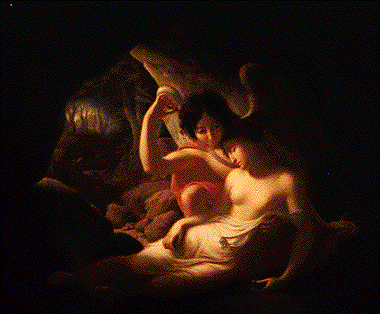Allgemein
Apuleius:
Encyclopaedia Britannica | article page
b. c. 124,, Madauros, Numidia [near modern Mdaourouch,
Alg.] d. , probably after 170
Platonic philosopher, rhetorician, and author remembered for The
Golden Ass, a prose narrative that proved influential
long after his death. The work, called Metamorphoses by
its author, narrates the adventures of a young man changed by
magic into an ass.
Apuleius,
who was educated at Carthage and Athens, traveled in the
Mediterranean region and became interested in contemporary
religious initiation rites, among them the ceremonies
associated with worship of the Egyptian goddess Isis.
Intellectually versatile and acquainted with works of both
Latin and Greek writers, he taught rhetoric in Rome before
returning to Africa to marry a rich widow, Aemilia Pudentilla.
To meet her family's charge that he had practiced magic to win
her affection, he wrote the Apologia ("Defense"),
the major source for his biography.
http://www.britannica.com/bcom/eb/article/3/0,5716,8213+1+8104,00.html
APULEIUS
and the Golden Ass
Lucius Apuleius lived and wrote in Latin in Romanized North
Africa around the middle of the 2 nd c. A.D. He was well
versed in the popular Greek writing of the time, and shows in
all his prose a strong interest in the supernatural, in
Eastern religions, and in magic. In fact he was accused of
casting spells on his wife by her family, and defended himself
in the legal defense, or Apologia which we have. His
interest in Greek philosophy led to the writing of a book of
philosophical extracts, the Florida, an essay on Plato,
another on Socrates' theology, and a translation from a
spurious work of Aristotle De Mundo.
But he is known
mainly for his Metamorphoses, a prose romantic novel in
eleven books which we have complete, written in an flowery but
engaging and quite readable style modeled on the Greek
Romances. However his vocabulary is large and the reader will
often find his nose in the dictionary. The most famous of the
many encapsulated stories is the long account of Cupid and
Psyche, which is amazingly close to the Germanic Cinderella
tale. The Metamorphoses often referred to as The Golden Ass,
is written in a Grecizing style, with fairly involved syntax,
couched in a large vocabulary.
http://www.middlebury.edu/~harris/LatinAuthors/Apuleius.html
APULEIUS,
Lucius
(c. 125-200), Roman philosopher and writer, born in Madaros,
Numidia (present-day Algeria). His father was a wealthy
magistrate. Apuleius (Appuleius) studied in Carthage at a
noted school of literature. He then went to Athens, where he
studied philosophy. Apuleius traveled extensively and went to
Rome in about 150 to practice law. About 155 he married a
wealthy but plain middle-aged woman whose relatives accused
him of having employed magic to gain her affections. His
defense, later published as the Apologia and still
extant, was an eloquent and successful vindication of his
conduct. He thereafter devoted himself to literature and
oratory. His popularity was so great that Carthage and other
cities erected statues to him.
The novel Metamorphoses
or Golden Ass is his most outstanding work. The
principal character, Lucian, is accidentally transformed by
magic into an ass. He recovers his human form by eating roses
in the hands of a priest of the Egyptian goddess Isis. The Metamorphoses,
often regarded as a satire on the vices of the age,
extensively influenced the works of later writers, such as
Henry Fielding, Tobias Smollett, and Giovanni Boccaccio.
Apuleius had the exceptional gift of accurate and vivid
observation of details, and his stories are extremely
realistic.
http://www.fwkc.com/encyclopedia/low/articles/a/a002000509f.html
|




